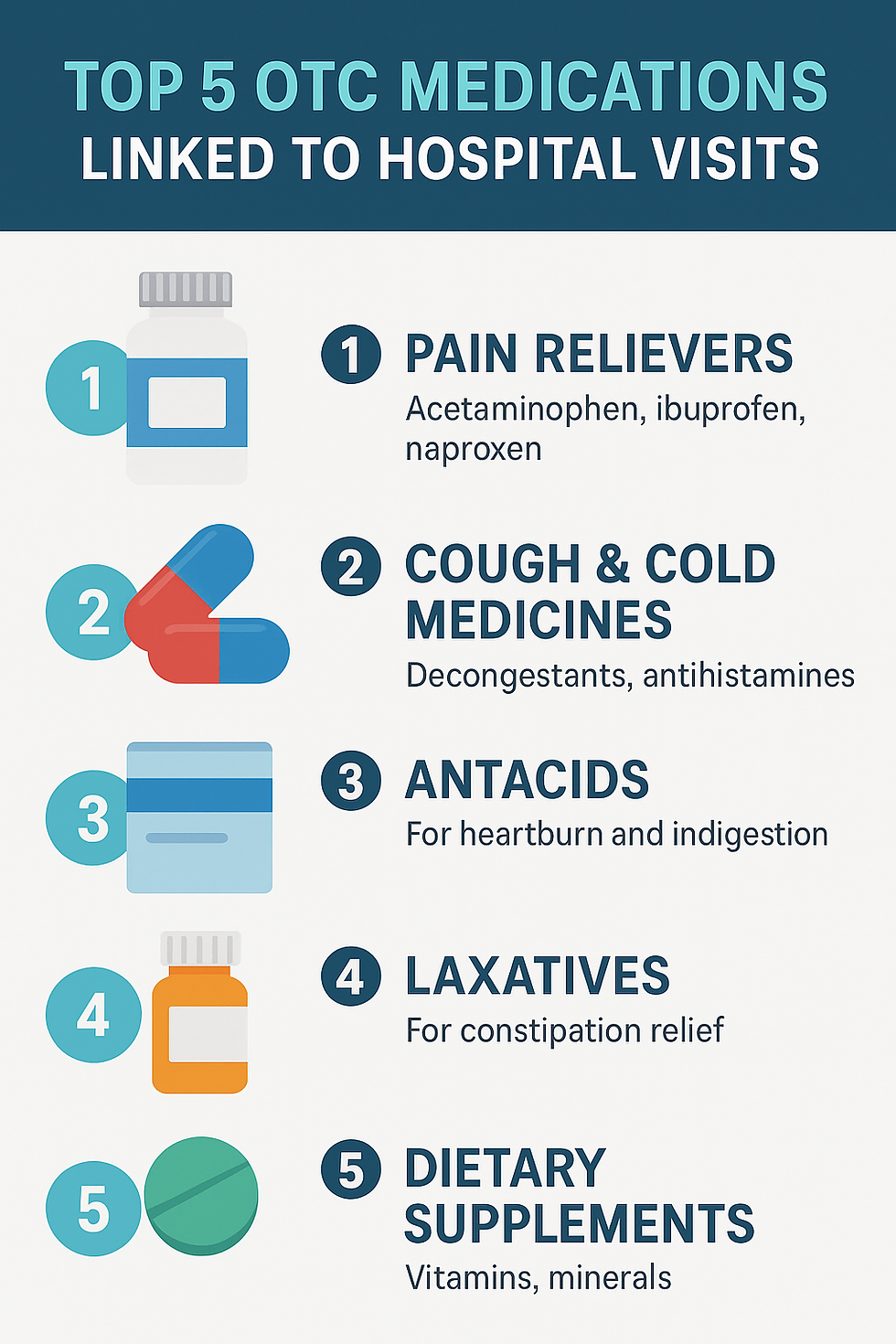Hidden Dangers of Over-the-Counter Medications: What You Need to Know
- Mehram Khaiser

- Nov 18, 2025
- 3 min read
Sana, a 28-year-old marketing executive, felt a mild headache after a long day at work.
Without thinking much, she grabbed an OTC painkiller from the corner store. ‘It’s just a headache,’ she thought.
But over the next few days, she started experiencing stomach cramps, dizziness, and fatigue that interfered with her meetings and workouts.
“I didn’t think an OTC pill could do this,” she admitted.
She isn’t alone.
Millions of people treat OTC medications as harmless quick fixes, unaware that “over-the-counter” does not mean risk-free.
From headaches to heartburn, coughs to allergies, these convenient solutions are often misused, sometimes with serious consequences.

OTC medications are drugs you can buy without a prescription, including painkillers, antacids, allergy medications, and cough syrups.
While convenient, misuse is common and can have serious consequences.
Common misuse patterns include:
Taking higher doses than recommended
Mixing medications with overlapping active ingredients
Using OTC drugs long-term without medical guidance
Ignoring underlying causes of symptoms
Many think, “It’s just a tablet, I’ve taken these before, so it’s fine.”
But even small missteps can escalate into serious health issues, especially in those with chronic conditions or other medications.
OTC misuse isn’t just a minor problem, it’s a public health issue!
Prevalence of Misuse: A study published in the Journal of the American Pharmacists Association indicates that the abuse and misuse of OTC medicines is a common problem in community pharmacies and is expected to escalate during the COVID-19 pandemic. (1)
Hospitalizations Due to Misuse: The U.S. Food and Drug Administration (FDA) reports that the misuse of OTC drugs causes approximately 178,000 hospitalizations annually. (2)
Lack of Awareness: Of the 2.2 million older adults considered at risk for a major ADE, more than 50% are at risk due to concurrent use of an OTC and prescription medication. (2)

Misuse of OTC medications can lead to short-term discomfort, long-term complications, and hidden interactions.
Short-term effects:
Nausea, dizziness, or fatigue
Allergic reactions
Upset stomach or heartburn
Long-term effects:
Liver damage from excessive acetaminophen
Kidney complications from NSAIDs
Gastrointestinal bleeding or ulcers
Hidden interactions: OTC medications can interact with prescription drugs for blood pressure, diabetes, or heart disease, sometimes causing life-threatening complications.
Mrs. Poly, a 65-year-old woman, went to the outpatient clinic with abdominal pain and dark stools. She had a history of heart attack and was on multiple heart medications (simvastatin, enalapril, atenolol) plus aspirin.
Three weeks earlier, she had developed muscle pain while working on her farm and was given diclofenac, a non-steroidal anti-inflammatory drug (NSAID). Following this, she developed blood-loss symptoms and was diagnosed with a bleeding peptic ulcer. Her doctor discontinued diclofenac and prescribed omeprazole.
After discharge, her son collected her medications. Confused, she continued taking all medicines, including the NSAID. A week later, she returned to the hospital with persistent abdominal pain. This incident underscores the dangers of polypharmacy, OTC misuse, and unclear instructions. (3)
These example shows why pharmacist guidance and label reading are non-negotiable.

What You Can Do (Practical Solutions)
Staying safe with OTC medications is simple if approached thoughtfully:
Read labels carefully – Check active ingredients, dosage, and warnings.
Consult a pharmacist – Especially before combining OTC with prescription drugs.
Track your usage – Don’t exceed recommended duration or doses.
Recognize symptoms – Don’t ignore persistent pain, digestive issues, or new side effects.
Store safely – Keep medications away from children and pets.
Seek professional advice – Some symptoms require evaluation rather than self-treatment.
Extra tips:
Keep a small notebook or app log of all medications you take.
Use only one medication for a symptom at a time.
Avoid OTC drugs for chronic conditions without guidance

Your health is in your hands. Before reaching for an OTC medication, pause and consider:
Is this the right drug for my symptom?
Am I following the recommended dose?
Could this interact with other medications I’m taking?
Even small pills can have big consequences.
Spread awareness
Share this article with friends and family. One conversation can prevent serious health issues.

References
Al Meslamani AZ, Abdel-Qader DH. The Abuse and Misuse of Over-the-Counter Medicines During COVID-19. Hosp Pharm. 2023;58(5):437-440. doi:10.1177/00185787231158777
Chui MA, Stone JA, Holden RJ. Improving over-the-counter medication safety for older adults: A study protocol for a demonstration and dissemination study. Res Social Adm Pharm. 2017;13(5):930-937. doi:10.1016/j.sapharm.2016.11.006
Medication Safety in Polypharmacy. Geneva: World Health Organization; 2019 (WHO/UHC/SDS/2019.11). Licence: CC BY-NC-SA 3.0 IGO.
Assessed and Endorsed by the MedReport Medical Review Board






